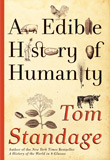Page 2 of 3
There are currently 15 member reviews
for An Edible History of Humanity
-
Kevin (Highland UT)
An Edible History of Humanity
The author puts forward his views that all large transformations in history were caused, enabled or influenced by food. The change as humans left hunter-gatherer societies and become agrarian societies allowed people to have the ability to stay in one place, to own personal items (because they did not have to carry them), to grow into various class distinctions, to eventually allow those in control to have others get food for them. The author argues that food (or the lack thereof) was the main reason for wars to occur.
A very interesting history. I was not expecting much but enjoyed the book. I don't think I will ever look at corn in the same way again.
-
Margie (Fairfax VA)
Review of An Edible History of Humanity
Tom Standage’s latest book presents history through the prism of food: how improvements to food production, food storage, and food distribution allowed for dramatic changes in human society – for example, empowering the transformation from a hunter-gatherer society to that of settled farmers. The author also examines other issues – such as the local food movement – in a balanced way, presenting the merits on both sides of the argument in an effort to find the middle ground. The text is presented in a very readable style, and even though it is essentially a history book, a comprehensive knowledge of world history is not a prerequisite for enjoyment.
-
John (Steilacoom WA)
An Edible History of Humanity
I found this to be an informative account of the impact of agriculture, and in some cases of specific foods, on human history.
I particularly enjoyed the accounts of the development of the spice trade and its impact on global exploration and the development of European colonial empires. There is also a good review of the failed attempts by the USSR and China to turn agriculture into productive state run collectives. The book is short enough not to get into too much minutiae but provides notes and a thorough bibliography for those seeking more information on specific subjects. I would recommend this to anyone interested in a good overview of this subject.
-
Elyse (Creswell OR)
Good Book, but Rather Dry
This book traces the connection between food and the rise of civilization, establishment of cities, the beginning of slavery, horticulture and mechanization – among many other things. Indeed, it seems from reading this book that it is food that is actually the root of all evil.
It is rather dry reading, if you are a history buff you would probably enjoy it. I chose to read it because I am interested in all aspects of food, but found it less interesting as I went on.
-
Mary Ann (Louisville KY)
Food For Thought
An Edible History of Humanity is slow going in the first couple of chapters, but if you stick with it you will be rewarded with how food has been used for so much more than sustenance. I was eager to learn about the many different aspects of food's interaction with the nation's of the world. I recommend this book to anyone that loves history, and little known facts.
-
Heather (Brooklyn NY)
Thoughtful, but not particularly inspired ...
I am a little bit of a history buff, and this is a thoughtful and well-written look at how food has changed the course of human history. Certainly it filled in some gaps in my knowledge, particularly in relation to the spice trade; in fact, the mythology of how spices were acquired is one of the most fascinating parts of the book. Overall, though, this is not a "History is fun!" excursion. Chapters detailing the wholesale starvation of helpless populations by lunatic dictators are especially heartbreaking. Generally this is a sobering read, concise and logically laid out, but a bit bland. I didn't get any real feeling of passion from the author about his subject ... I kept feeling like something was "missing" from the book. It's good, yes, but not exceptional, and I wouldn't seek out this particular author again.
-
Janice (Holland MI)
An Edible History . .. .
An Edible History of Humanity is packed with information - at times interesting, and at other times really difficult to read through. This book would be well suited as additional reading for a college level history or sociology class. I would not recommend this as book club read.
